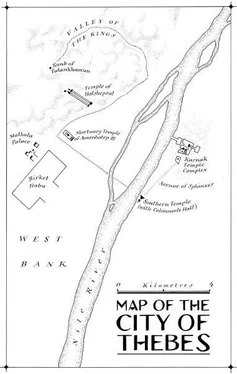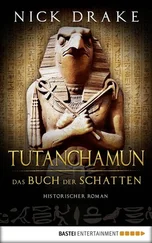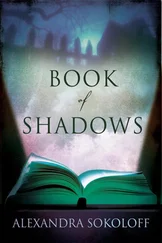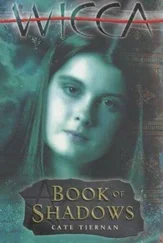Nick Drake - Tutankhamun - The Book of Shadows
Здесь есть возможность читать онлайн «Nick Drake - Tutankhamun - The Book of Shadows» весь текст электронной книги совершенно бесплатно (целиком полную версию без сокращений). В некоторых случаях можно слушать аудио, скачать через торрент в формате fb2 и присутствует краткое содержание. Жанр: Исторический детектив, на английском языке. Описание произведения, (предисловие) а так же отзывы посетителей доступны на портале библиотеки ЛибКат.
- Название:Tutankhamun: The Book of Shadows
- Автор:
- Жанр:
- Год:неизвестен
- ISBN:нет данных
- Рейтинг книги:4 / 5. Голосов: 1
-
Избранное:Добавить в избранное
- Отзывы:
-
Ваша оценка:
- 80
- 1
- 2
- 3
- 4
- 5
Tutankhamun: The Book of Shadows: краткое содержание, описание и аннотация
Предлагаем к чтению аннотацию, описание, краткое содержание или предисловие (зависит от того, что написал сам автор книги «Tutankhamun: The Book of Shadows»). Если вы не нашли необходимую информацию о книге — напишите в комментариях, мы постараемся отыскать её.
Tutankhamun: The Book of Shadows — читать онлайн бесплатно полную книгу (весь текст) целиком
Ниже представлен текст книги, разбитый по страницам. Система сохранения места последней прочитанной страницы, позволяет с удобством читать онлайн бесплатно книгу «Tutankhamun: The Book of Shadows», без необходимости каждый раз заново искать на чём Вы остановились. Поставьте закладку, и сможете в любой момент перейти на страницу, на которой закончили чтение.
Интервал:
Закладка:
The King raced onwards, and I saw him struggling to control the chariot, and at the same time to fit an arrow into his bow. Now the lion turned, and his loping strides quickly become full-stretched flight at incredible speed towards the safety of the dark bluffs. I lashed my horse onwards, and gained on the King. I thought surely he would realize there was no chance of hunting the lion in these conditions, but suddenly his chariot jumped up in the air as if it had hit a rock, and then slammed down again. As it did so the left wheel shattered and sheared, the spokes and wheel rim splintered and flew off, and the carriage collapsed on to its left side. It was dragged wildly across the rough ground by the panicked horses. I saw the King gripping on to the side of the chariot in terrror; but in the next moment his body flew up like a rag doll, and then hit the ground at speed, rolling over and over, until it came to rest in the darkness.
I reined in my horse, and my chariot skidded to a halt. I ran to his body. He was not moving. I dropped to my knees beside him. Tutankhamun, Living Image of Amun, was making small sounds that tried and failed to become words. He did not seem to recognize me. There was a puddle of blood, black and shiny, spreading on the dust of the desert.
His left leg above the knee was sticking out at a sickening angle. I carefully peeled the linen of his robe, sticky with blood, away from the skin. Shards of shattered bone protruded through the torn flesh and skin. There was grit and dirt in the horrible, deep wound. He gave a terrible moan of acute pain. I poured water from my flask, and the blood washed away, black and thick. I feared he would die there, in the desert, under the moon and the stars, his head in my hands like a chalice of nightmares.
Simut arrived, and took one look at the disastrous wound.
‘I will fetch Pentu. Don’t move him,’ he shouted, as he rode away.
The tracker and I stayed with the King. He had begun to shiver violently with shock. I tore the panther skin from the floor of the chariot, and covered him with it as gently as possible.
He was trying to speak. I lowered my head to catch his words.
‘I am sorry,’ he kept repeating.
‘The wound is superficial,’ I said, trying to reassure him. ‘The physician is coming. You will be fine.’
He gazed at me from the strange distance of his agony, and I knew he knew I was lying.
Pentu arrived and examined the King. He checked first his head, but aside from the swelling of bruises and long scratches down one side of his face, there were no signs of bleeding at the nose or ears, and so he concluded the skull was not fractured. At least that was something. He then examined the wound and the broken bone by the light of our torches. He glanced up at Simut and me, and shook his head. Not good. We stood apart so that the King could not hear us.
‘We are lucky that the artery in the leg has not been severed. But he is losing a great deal of blood. We must reset this fracture immediately,’ he said.
‘Out here?’ I asked.
He nodded.
‘It is imperative he is not moved again until this is done. I will need your help. This is a difficult bone to set, for the fracture is severe, and the muscles of the leg and thigh are powerful. And there will be some overriding of the shattered bone-ends. But we cannot move him until it is done.’
He assessed the angle of the broken bones. The King’s limbs seemed like the parts of a mangled doll. Pentu placed a rolled-up linen cloth between his chattering teeth. Then as I held his torso and upper thigh firmly in position, and Simut held the other side of his body, Pentu swiftly pushed down on the femur, and with a practised motion jammed the shattered bone-ends together. The King screamed like an animal. The gristly noise of the setting reminded me of the kitchen, when I break apart the haunch of a gazelle, twisting its leg bones from the thigh socket. This was butcher’s work. Then the King vomited, and passed from consciousness.
Pentu set to work by the flickering torchlight, stitching the ugly wound with a curved copper needle he produced from a case made of bird bone. Then he smeared honey and oil on it, and bound it tightly in linen bandages. Finally he made the leg as secure as possible within a splint padded with linen and secured by knots, for the journey back to the camp.
The King was carried into his quarters. His skin was clammy and pale. We gathered around, in a hushed, urgent conference.
‘The fracture is of the worst kind, both because the bone has shattered, rather than snapped across, and because the skin has been torn open, making the flesh vulnerable to infection. There has been loss of blood. But at least everything has been reset. Let us pray to Ra the fever will pass, and the wound heals well,’ said Pentu gravely.
A low sense of dread had fallen upon us all.
‘But he is now asleep, which is good. His spirit will be pleading with the Gods of the Otherworld for more time, and more life. Let us pray they are persuaded.’
‘What should we do now?’ I asked.
‘The most sensible decision medically would be to transport him swiftly to Memphis,’ said Pentu. ‘At least there I can care for him properly.’
Simut interrupted: ‘But in Memphis he would be surrounded by his enemies. Horemheb is likely still in residence. I say we must return him to Thebes in secrecy, as swiftly as possible. And this accident must be kept secret until a public version of events has been agreed with Ay. If the King-life, prosperity and health be upon him-is fated to die, then it must be in Thebes, among his own people, and near to his tomb. And we must control how his death is understood. Of course, if he lives, then he can best be cared for at home.’
We broke camp that night and started our sorrowful journey under the stars, back across the desert towards the distant ship, and the Great River that would carry us all home to the city. I tried not to let myself think what the consequences would be for all of us, and for the future of the Two Lands, if he died.
33
I kept vigil at the bedside of Tutankhamun as he twisted and turned in feverish agony all through the nights of the river journey back to Thebes. His heart seemed to race in his chest, trapped and frail, like a tiny bird. Pentu treated him with purgatives, to prevent the beginning of putrefaction in the bowels spreading morbidly to the heart. And he contended with the leg wound, tying and retying the wooden splints, changing the linen padding regularly, so that the splintered bones might have some chance of binding together.
He had struggled to keep the wound clean, at first binding it with fresh meat, and then poultices of honey, fat and oil. But each time he changed the bandaging, and applied more cedar resin, I could see the lips were hesitating from binding, and now a deep black shadow was creeping through the flesh, under the skin, in every direction. The smell of rotting flesh was vile. Pentu tried everything: a decoction of willow bark, barley flour, the ash of a plant whose name he would not reveal, mixed with onion and vinegar, and a white ointment made from minerals found in the desert mines of the oasis towns. Nothing worked.
On the second morning of the journey, with Pentu’s permission, I spoke to the King. The fresh daylight entering his chamber seemed to calm and cheer him after a long, painful night. He had been washed, and dressed in fresh linens. But already he was drenched in sweat, and his eyes were dull.
‘Life, prosperity and health,’ I said, quietly, aware of the grim irony of the formula.
‘No degree of prosperity, no gold nor treasure, can bring back life and health,’ he whispered.
‘The physician is confident of a full recovery,’ I said, trying to maintain my encouraging expression.
Читать дальшеИнтервал:
Закладка:
Похожие книги на «Tutankhamun: The Book of Shadows»
Представляем Вашему вниманию похожие книги на «Tutankhamun: The Book of Shadows» списком для выбора. Мы отобрали схожую по названию и смыслу литературу в надежде предоставить читателям больше вариантов отыскать новые, интересные, ещё непрочитанные произведения.
Обсуждение, отзывы о книге «Tutankhamun: The Book of Shadows» и просто собственные мнения читателей. Оставьте ваши комментарии, напишите, что Вы думаете о произведении, его смысле или главных героях. Укажите что конкретно понравилось, а что нет, и почему Вы так считаете.











